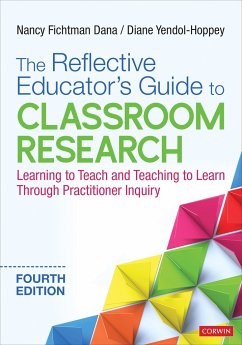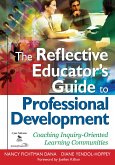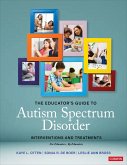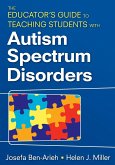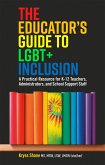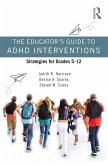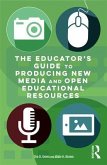Nancy Fichtman Dana (University of Florida, Gainesville, USA), Diane Yendol-Hoppey (USA University of North Florida)
The Reflective Educator's Guide to Classroom Research
Learning to Teach and Teaching to Learn Through Practitioner Inquiry
Nancy Fichtman Dana (University of Florida, Gainesville, USA), Diane Yendol-Hoppey (USA University of North Florida)
The Reflective Educator's Guide to Classroom Research
Learning to Teach and Teaching to Learn Through Practitioner Inquiry
- Broschiertes Buch
- Merkliste
- Auf die Merkliste
- Bewerten Bewerten
- Teilen
- Produkt teilen
- Produkterinnerung
- Produkterinnerung
This book helps educators everywhere to understand the importance of teacher inquiry and data analysis and provides a step-by-step description of the action research process.
Andere Kunden interessierten sich auch für
![The Reflective Educator's Guide to Professional Development The Reflective Educator's Guide to Professional Development]() Nancy Fichtman DanaThe Reflective Educator's Guide to Professional Development45,99 €
Nancy Fichtman DanaThe Reflective Educator's Guide to Professional Development45,99 €![The Educator's Guide to Autism Spectrum Disorder The Educator's Guide to Autism Spectrum Disorder]() The Educator's Guide to Autism Spectrum Disorder48,99 €
The Educator's Guide to Autism Spectrum Disorder48,99 €![The Educator's Guide to Teaching Students with Autism Spectrum Disorders The Educator's Guide to Teaching Students with Autism Spectrum Disorders]() Josefa Ben-AriehThe Educator's Guide to Teaching Students with Autism Spectrum Disorders41,99 €
Josefa Ben-AriehThe Educator's Guide to Teaching Students with Autism Spectrum Disorders41,99 €![The Educator's Guide to Lgbt+ Inclusion The Educator's Guide to Lgbt+ Inclusion]() Kryss ShaneThe Educator's Guide to Lgbt+ Inclusion28,99 €
Kryss ShaneThe Educator's Guide to Lgbt+ Inclusion28,99 €![The Educator's Guide to ADHD Interventions The Educator's Guide to ADHD Interventions]() Judith R. HarrisonThe Educator's Guide to ADHD Interventions32,99 €
Judith R. HarrisonThe Educator's Guide to ADHD Interventions32,99 €![The Educator's Guide to Texas School Law The Educator's Guide to Texas School Law]() Jim WalshThe Educator's Guide to Texas School Law35,99 €
Jim WalshThe Educator's Guide to Texas School Law35,99 €![The Educator's Guide to Producing New Media and Open Educational Resources The Educator's Guide to Producing New Media and Open Educational Resources]() Tim D. Green (California State University, Fullerton, USA)The Educator's Guide to Producing New Media and Open Educational Resources47,99 €
Tim D. Green (California State University, Fullerton, USA)The Educator's Guide to Producing New Media and Open Educational Resources47,99 €-
-
-
This book helps educators everywhere to understand the importance of teacher inquiry and data analysis and provides a step-by-step description of the action research process.
Hinweis: Dieser Artikel kann nur an eine deutsche Lieferadresse ausgeliefert werden.
Hinweis: Dieser Artikel kann nur an eine deutsche Lieferadresse ausgeliefert werden.
Produktdetails
- Produktdetails
- Verlag: SAGE Publications Inc
- 4 Revised edition
- Seitenzahl: 352
- Erscheinungstermin: 15. Oktober 2019
- Englisch
- Abmessung: 251mm x 174mm x 22mm
- Gewicht: 674g
- ISBN-13: 9781544352183
- ISBN-10: 1544352182
- Artikelnr.: 56974136
- Herstellerkennzeichnung
- Libri GmbH
- Europaallee 1
- 36244 Bad Hersfeld
- gpsr@libri.de
- Verlag: SAGE Publications Inc
- 4 Revised edition
- Seitenzahl: 352
- Erscheinungstermin: 15. Oktober 2019
- Englisch
- Abmessung: 251mm x 174mm x 22mm
- Gewicht: 674g
- ISBN-13: 9781544352183
- ISBN-10: 1544352182
- Artikelnr.: 56974136
- Herstellerkennzeichnung
- Libri GmbH
- Europaallee 1
- 36244 Bad Hersfeld
- gpsr@libri.de
Nancy Fichtman Dana is professor of education and distinguished teaching scholar at the University of Florida, Gainesville. She began her career in education as an elementary school teacher in Hannibal Central Schools, New York. Since earning her PhD from Florida State University in 1991, she has been a passionate advocate for teacher inquiry and has worked extensively in supporting schools, districts, and universities in implementing powerful programs of job-embedded professional development through inquiry across the United States and in several countries, including Belgium, the Netherlands, China, South Korea, Estonia, Slovenia, Spain, and Portugal. She has published 12 books and more than 100 articles in professional journals and edited books focused on her research exploring teacher and principal professional development and practitioner inquiry. Dana has received many honors for her teaching, research, and writing. Among them are the Association of Teacher Educators Mentoring and Distinguished Research in Teacher Education awards, the Carnegie Project on the Education Doctorate's David G. Imig Distinguished Service Award, the National Staff Development Council (now Learning Forward) Book of the Year Award, and was one of three finalist in Baylor University's prestigious Robert Foster Cherry Award for Great Teaching 2020 competition. Before joining the faculty at University of Florida in 2003, she worked at The Pennsylvania State University for 11 years, creating and launching their award-winning inquiry-based Professional Development School program with the State College Area School District. At the University of Florida, she worked to embed inquiry as a signature pedagogy into the undergraduate teacher education program, as well as developed and taught three popular classes on inquiry at the master's and doctoral levels. In partnership with the Lastinger Center for Learning, Dana led the development and implementation of inquiry-based professional development for teachers across the state that included several of the nation's largest school districts. Further, she was instrumental in the development of UF's Teacher Leadership for School Improvement Program and Professional Practice Doctorate in Teachers, Schools, and Society, both national award winning programs that highlight inquiry as a signature program feature and have been recognized by U.S. News & World Report as the #1 Online Graduate Education Programs in the nation.
Preface
About This Book
Acknowledgments
About the Authors
How to Use the Inquiry Books
Chapter 1. Teacher Inquiry Defined
What Is Teacher Inquiry?
What Is the Relationship Between Teacher Inquiry and Teacher Professional
Growth?
What Evidence Exists That Teacher Inquiry Is Worth Doing?
How Is Teacher Inquiry Different From What I Already Do as a Reflective
Teacher?
Why Inquire? Inquiry as a Pathway to Equity
What Are Some Contexts Ripe for Teacher Inquiry?
How Does My Engaging in Teacher Inquiry Help Shape the Profession of
Teaching?
Chapter 2. The Start of Your Journey: Finding a Wondering
Where Do I Begin?
Where Do I Find My Wonderings and Questions?
What Happens If I Still Cannot Locate My Wondering?
Chapter 3. Learning With and From the Literature: The Importance of Reading
Why Read?
Where and How Do I Find Readings to Inform My Inquiry?
A Few Words of Literature Wisdom
Chapter 4. Learning With and From Your Colleagues: The Importance of
Collaboration
Why Is Collaboration So Important?
What Are the Possibilities for How I Might Collaborate?
Chapter 5. Developing a Research Plan: Making Inquiry a Part of Your
Teaching Practice
What Do Data Look Like, How Do I Collect Them, and How Do They Fit Into My
Work as a Teacher?
When Do I Collect Data and How Much Do I Collect?
Chapter 6. Considering the Ethical Dimensions of Your Work as an Inquirer
What Should I Consider When Thinking About Ethics in Relation to
Practitioner Research?
What Role Do School District Research Policies Play in the Inquiry Process?
What Role Do University Institutional Review Boards Play in the Inquiry
Process?
Chapter 7. Finding Your Findings: Data Analysis
What Is Formative Data Analysis?
What Is Summative Data Analysis?
What Might Summative Analysis of Qualitative Data Look Like?
Chapter 8. Making Your Inquiry Public: Publishing and Presenting
Why Is It Important to Share My Work With Others?
How Do I Present My Work?
How Do I Write About My Work?
What Might My Writing Look Like?
Chapter 9. Contributing to the Creation of More Equitable Schools and
Classrooms: The Why of Inquiry
Coming to View Inquiry as a Pathway to Equity: A Teacher Researcher's Story
(Mickey MacDonald)
Informing Thinking, Teaching, and Teacher Education: The Power of
Equity-Focused Inquiry (Paige Bildstein, Mikhayla Kruse-Meek, Jillian
Pohland, Nicole Snitkey, and Hilarie Welsh)
Chapter 10. On Your Way: Becoming the Best Teacher and Researcher You Can
Be
What Is an Inquiry Stance?
Why Is It Important to Assess the Quality of My Work?
What Is the Difference Between Generalizability and Transferability?
How Do I Go About Assessing Teacher Research Quality and Why Is It So
Difficult to Do?
What Are Some Quality Indicators for Teacher Research?
What Are Some Ways to Enhance Inquiry Quality?
Where Do I Go From Here?
References
Index
About This Book
Acknowledgments
About the Authors
How to Use the Inquiry Books
Chapter 1. Teacher Inquiry Defined
What Is Teacher Inquiry?
What Is the Relationship Between Teacher Inquiry and Teacher Professional
Growth?
What Evidence Exists That Teacher Inquiry Is Worth Doing?
How Is Teacher Inquiry Different From What I Already Do as a Reflective
Teacher?
Why Inquire? Inquiry as a Pathway to Equity
What Are Some Contexts Ripe for Teacher Inquiry?
How Does My Engaging in Teacher Inquiry Help Shape the Profession of
Teaching?
Chapter 2. The Start of Your Journey: Finding a Wondering
Where Do I Begin?
Where Do I Find My Wonderings and Questions?
What Happens If I Still Cannot Locate My Wondering?
Chapter 3. Learning With and From the Literature: The Importance of Reading
Why Read?
Where and How Do I Find Readings to Inform My Inquiry?
A Few Words of Literature Wisdom
Chapter 4. Learning With and From Your Colleagues: The Importance of
Collaboration
Why Is Collaboration So Important?
What Are the Possibilities for How I Might Collaborate?
Chapter 5. Developing a Research Plan: Making Inquiry a Part of Your
Teaching Practice
What Do Data Look Like, How Do I Collect Them, and How Do They Fit Into My
Work as a Teacher?
When Do I Collect Data and How Much Do I Collect?
Chapter 6. Considering the Ethical Dimensions of Your Work as an Inquirer
What Should I Consider When Thinking About Ethics in Relation to
Practitioner Research?
What Role Do School District Research Policies Play in the Inquiry Process?
What Role Do University Institutional Review Boards Play in the Inquiry
Process?
Chapter 7. Finding Your Findings: Data Analysis
What Is Formative Data Analysis?
What Is Summative Data Analysis?
What Might Summative Analysis of Qualitative Data Look Like?
Chapter 8. Making Your Inquiry Public: Publishing and Presenting
Why Is It Important to Share My Work With Others?
How Do I Present My Work?
How Do I Write About My Work?
What Might My Writing Look Like?
Chapter 9. Contributing to the Creation of More Equitable Schools and
Classrooms: The Why of Inquiry
Coming to View Inquiry as a Pathway to Equity: A Teacher Researcher's Story
(Mickey MacDonald)
Informing Thinking, Teaching, and Teacher Education: The Power of
Equity-Focused Inquiry (Paige Bildstein, Mikhayla Kruse-Meek, Jillian
Pohland, Nicole Snitkey, and Hilarie Welsh)
Chapter 10. On Your Way: Becoming the Best Teacher and Researcher You Can
Be
What Is an Inquiry Stance?
Why Is It Important to Assess the Quality of My Work?
What Is the Difference Between Generalizability and Transferability?
How Do I Go About Assessing Teacher Research Quality and Why Is It So
Difficult to Do?
What Are Some Quality Indicators for Teacher Research?
What Are Some Ways to Enhance Inquiry Quality?
Where Do I Go From Here?
References
Index
Preface
About This Book
Acknowledgments
About the Authors
How to Use the Inquiry Books
Chapter 1. Teacher Inquiry Defined
What Is Teacher Inquiry?
What Is the Relationship Between Teacher Inquiry and Teacher Professional
Growth?
What Evidence Exists That Teacher Inquiry Is Worth Doing?
How Is Teacher Inquiry Different From What I Already Do as a Reflective
Teacher?
Why Inquire? Inquiry as a Pathway to Equity
What Are Some Contexts Ripe for Teacher Inquiry?
How Does My Engaging in Teacher Inquiry Help Shape the Profession of
Teaching?
Chapter 2. The Start of Your Journey: Finding a Wondering
Where Do I Begin?
Where Do I Find My Wonderings and Questions?
What Happens If I Still Cannot Locate My Wondering?
Chapter 3. Learning With and From the Literature: The Importance of Reading
Why Read?
Where and How Do I Find Readings to Inform My Inquiry?
A Few Words of Literature Wisdom
Chapter 4. Learning With and From Your Colleagues: The Importance of
Collaboration
Why Is Collaboration So Important?
What Are the Possibilities for How I Might Collaborate?
Chapter 5. Developing a Research Plan: Making Inquiry a Part of Your
Teaching Practice
What Do Data Look Like, How Do I Collect Them, and How Do They Fit Into My
Work as a Teacher?
When Do I Collect Data and How Much Do I Collect?
Chapter 6. Considering the Ethical Dimensions of Your Work as an Inquirer
What Should I Consider When Thinking About Ethics in Relation to
Practitioner Research?
What Role Do School District Research Policies Play in the Inquiry Process?
What Role Do University Institutional Review Boards Play in the Inquiry
Process?
Chapter 7. Finding Your Findings: Data Analysis
What Is Formative Data Analysis?
What Is Summative Data Analysis?
What Might Summative Analysis of Qualitative Data Look Like?
Chapter 8. Making Your Inquiry Public: Publishing and Presenting
Why Is It Important to Share My Work With Others?
How Do I Present My Work?
How Do I Write About My Work?
What Might My Writing Look Like?
Chapter 9. Contributing to the Creation of More Equitable Schools and
Classrooms: The Why of Inquiry
Coming to View Inquiry as a Pathway to Equity: A Teacher Researcher's Story
(Mickey MacDonald)
Informing Thinking, Teaching, and Teacher Education: The Power of
Equity-Focused Inquiry (Paige Bildstein, Mikhayla Kruse-Meek, Jillian
Pohland, Nicole Snitkey, and Hilarie Welsh)
Chapter 10. On Your Way: Becoming the Best Teacher and Researcher You Can
Be
What Is an Inquiry Stance?
Why Is It Important to Assess the Quality of My Work?
What Is the Difference Between Generalizability and Transferability?
How Do I Go About Assessing Teacher Research Quality and Why Is It So
Difficult to Do?
What Are Some Quality Indicators for Teacher Research?
What Are Some Ways to Enhance Inquiry Quality?
Where Do I Go From Here?
References
Index
About This Book
Acknowledgments
About the Authors
How to Use the Inquiry Books
Chapter 1. Teacher Inquiry Defined
What Is Teacher Inquiry?
What Is the Relationship Between Teacher Inquiry and Teacher Professional
Growth?
What Evidence Exists That Teacher Inquiry Is Worth Doing?
How Is Teacher Inquiry Different From What I Already Do as a Reflective
Teacher?
Why Inquire? Inquiry as a Pathway to Equity
What Are Some Contexts Ripe for Teacher Inquiry?
How Does My Engaging in Teacher Inquiry Help Shape the Profession of
Teaching?
Chapter 2. The Start of Your Journey: Finding a Wondering
Where Do I Begin?
Where Do I Find My Wonderings and Questions?
What Happens If I Still Cannot Locate My Wondering?
Chapter 3. Learning With and From the Literature: The Importance of Reading
Why Read?
Where and How Do I Find Readings to Inform My Inquiry?
A Few Words of Literature Wisdom
Chapter 4. Learning With and From Your Colleagues: The Importance of
Collaboration
Why Is Collaboration So Important?
What Are the Possibilities for How I Might Collaborate?
Chapter 5. Developing a Research Plan: Making Inquiry a Part of Your
Teaching Practice
What Do Data Look Like, How Do I Collect Them, and How Do They Fit Into My
Work as a Teacher?
When Do I Collect Data and How Much Do I Collect?
Chapter 6. Considering the Ethical Dimensions of Your Work as an Inquirer
What Should I Consider When Thinking About Ethics in Relation to
Practitioner Research?
What Role Do School District Research Policies Play in the Inquiry Process?
What Role Do University Institutional Review Boards Play in the Inquiry
Process?
Chapter 7. Finding Your Findings: Data Analysis
What Is Formative Data Analysis?
What Is Summative Data Analysis?
What Might Summative Analysis of Qualitative Data Look Like?
Chapter 8. Making Your Inquiry Public: Publishing and Presenting
Why Is It Important to Share My Work With Others?
How Do I Present My Work?
How Do I Write About My Work?
What Might My Writing Look Like?
Chapter 9. Contributing to the Creation of More Equitable Schools and
Classrooms: The Why of Inquiry
Coming to View Inquiry as a Pathway to Equity: A Teacher Researcher's Story
(Mickey MacDonald)
Informing Thinking, Teaching, and Teacher Education: The Power of
Equity-Focused Inquiry (Paige Bildstein, Mikhayla Kruse-Meek, Jillian
Pohland, Nicole Snitkey, and Hilarie Welsh)
Chapter 10. On Your Way: Becoming the Best Teacher and Researcher You Can
Be
What Is an Inquiry Stance?
Why Is It Important to Assess the Quality of My Work?
What Is the Difference Between Generalizability and Transferability?
How Do I Go About Assessing Teacher Research Quality and Why Is It So
Difficult to Do?
What Are Some Quality Indicators for Teacher Research?
What Are Some Ways to Enhance Inquiry Quality?
Where Do I Go From Here?
References
Index

